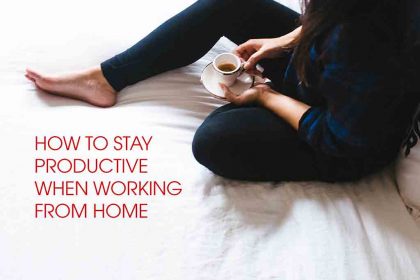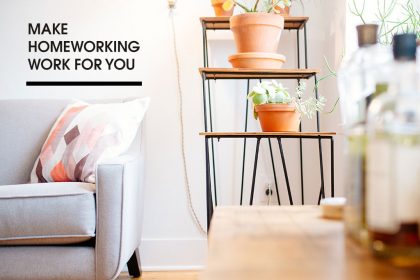Seven ways to care for your mental health when you work from home
Working from home may seem like the perfect set-up, but many home workers find themselves struggling with the loneliness. Here are seven ways you can care for your mental health.
If you belong to one of the UK’s 4.81 million self-employed workers, you’ve probably ditched the office for a reason and relish the idea of the calm and freedom that working from home will bring – for example the chance to be away from bosses and co-workers, or perhaps the ability to watch your kids if you have any.
Even if you still have an employer but have the ability to work remotely part-time, the simple prospect of skipping your commute and being able to work in your slippers is an enticing one!
Working from home isn’t always the utopia you envisaged
As many people who work from home quickly realise, it’s not all brainstorming around the kitchen table while your child draws peacefully in the next room though.
Working from home is said to lower stress lower stress, boost morale and improve efficiency– meaning fewer sick days and higher job satisfaction. On the flipside, freelancers often work more hours and have higher anxiety levels.
It’s easy to get a bit lost and overwhelmed, whether it’s stress from pitching for new work and worrying if you’ll have enough to pay the bills, or managing your time without a set schedule and meeting deadlines. This is especially true if you don’t set clear boundaries between your work and home life, and your mental health can take a toll.
Seven important ways to care for your mental health
There are plenty of things you can do to avoid this and take good care of your mental wellbeing though, and you’ll be able to stay on top of things by staying aware of your state of mind and ensuring you’re looking after yourself as well as securing your next pay check. Keep reading to find out how!
1) Get dressed for work (at least some of the time)
The idea of ditching the high heels for good and only ever working in your PJs is an appealing one, but the brain associates work clothes with work and pyjamas with… well, anything but work.
You don’t have to be dressed for a boardroom meeting, but making the effort to have a routine of getting ready and wearing dedicated work clothes can signal to your brain that you’re ready to start your day and get down to business.
‘Work clothes’ could just be different comfortable clothes – like switching your PJs for yoga pants or leggings – but you could also put on a dressier item of clothing when you need to get some serious work done or make an important phone call. It’s all about how the clothes make you feel!
Another advantage of wearing different clothes to work in is that this helps you separate work from your free time, a division that can be pretty blurred for many freelancers!
2) Have a dedicated workspace and keep it sacred
Separate your workspace from the family, pets and general hustle and bustle around the house. Varying your work environment can help you to be more creative, so by all means take your laptop onto the balcony when it’s nice or spend a day cocooned on the couch, but set aside a work area to help you create some boundaries between work and life and use it when you need some time to concentrate.
If you’re lucky enough to be able to set aside a separate room, you can literally just shut the door to get a bit of peace. But even if your domain is basically the cupboard under the stairs, make it yours and don’t let family life and its clutter encroach.
Make it a rule that if you’re sitting at your desk then you’re at work and talking to you is a no-go. That way you can signal to everyone that you’re concentrating and don’t want to be disturbed, and just knowing that you have this option is comforting.
3) Get inspired
To boost your creativity, make are you take breaks and physically step away from your tasks. Pinterest or favourite blogs can be great places to lose yourself in and recharge, especially if you’re in a creative line of work. Just look at some beautiful images and designs, delicious foods or funny stories for a few minutes and let your mind wander!
Other ideas include:
- Doodle.
- Do some brainteasers or puzzles.
- Listen to music or a podcast.
- Watch a quick stand-up comedy video or a TED talk.
- Knit.
- Craft.
- Read a chapter of a book.
- Go on Duolingo to practice a language for a few minutes.
- Text your Mum/partner/friend… the list goes on!
4) Get out into nature
If you can, go for a walk in nature, or even look at some greenery if you’re not near a green space. Since you’re also getting some fresh air and exercise while you’re at it, a walk is not only good for your mental block, but for your physical wellbeing too.
On that note, exercise has been proven to help your mental health in general, so it’s a double win if you can shift some of your fitness-routine to be outdoors – weather-permitting of course!
Even if you’re rushed off your feet, remind yourself that the five or ten minutes you’re investing in taking a break will mean that you’re going to be approaching your task with renewed energy and more focus – which should save you time in the long run! Consider setting a timer though, or you may find yourself down the rabbit hole for longer than the “just five minutes” you planned!
5) Get a homeworking buddy
Support from your loving friends and family is great, but sometimes you just need someone who can relate to your work problems! There are lots of ways to do this: find a Facebook group for freelancers in your field or an online blogging buddy and set up regular Skype sessions.
Even better, try to attend the odd industry networking event or find someone who lives in your area and meet up from time to time.
Making time to vent, bounce ideas around and ask for advice, or even just to chit-chat, will keep you grounded. Explaining an issue to someone often makes you see everything more clearly, and it works both ways too – as well as the support they provide to you, you might be able to return the favour by being their voice of reason.
As an added bonus, having an industry chum might even boost your productivity by making you more accountable!
6) Have a weekly coffee date, gym session or pub catch-up
It’s important to make time for catch-ups with people – no matter what your deadlines are! A common downside of working from home is the potential to feel quite isolated, and many people don’t even realise that this might be the reason they’re feeling a bit down. (Who’d have thought you’d actually miss the small talk in the office kitchen!)
Even if one of the key reasons you decided to work from home was that you didn’t want to deal with people, that’s fine – you’re in charge of deciding on the type and length of social interaction after all, not to mention the people you want to interact with!
But you’d be surprised at the benefits of some simple, quality interaction with others on your happiness and mental wellbeing, even if you don’t consider yourself a huge people person.
So make a point to properly leave the house and have some face-to-face human contact that isn’t a child, partner or shop assistant. Try to also talk about non-work related things, and make sure you do this regularly, maybe even at the same time each week to save planning a time and date every time.
7) Try co-working
Make plans to work in a shared space one day or afternoon per week. It might be the perfect balance between the peace and quiet you need and the social interaction your work needs. (Especially having some impartial feedback and people to tell you if your ideas make sense!)
It’s a nice way to still feel part of things while having the freedom to decide when you want to do that, and you might even get a whole different perspective from someone who isn’t in the same industry as you.
Not unlike how studying in the library probably made you get more work done because everyone else looked like they were working hard, being surrounded by productive people can also give you the motivation to get off Facebook already and focus.
There are lots of different options to suit your situation: from simply sitting in a café together to taking turns working in someone’s home office, to officially renting a desk in a dedicated co-working office. There are even some co-working spaces which offer childcare or have arrangements to trade babysitting hours.
Enjoy the freedom and flexibility of working from home
Working from home can give you an amazing amount of freedom and flexibility – but it can be stressful and isolating too sometimes. It’s important to look after yourself by creating some routines, setting clear boundaries and ensuring that you have regular breaks and contact with your support network.
This lets you make the most of all the advantages that freelancing brings (even napping in the middle of the day!) and while still making sure you’re taking good care of your mental health.
Emily McLaren is a travel and fitness blogger. You can read her blog here.
Photo by Jarosław Ceborski










